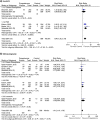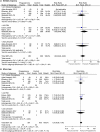Efficacy of luteal phase support with vaginal progesterone in intrauterine insemination: a systematic review and meta-analysis
- PMID: 24189966
- PMCID: PMC3909129
- DOI: 10.1007/s10815-013-0127-6
Efficacy of luteal phase support with vaginal progesterone in intrauterine insemination: a systematic review and meta-analysis
Abstract
Purpose: To evaluate the efficacy of luteal phase support with vaginal progesterone in women undergoing intrauterine insemination (IUI).
Methods: Systematic review and meta-analysis. Randomized controlled trials (RCT) comparing supplementation of luteal phase with vaginal progesterone among women undergoing IUI versus a control group were included. The main outcome assessed was live birth rate.
Results: Five RCT met the inclusion criteria. In all 1,271 patients were included (951 IUI cycles in the progesterone group, 935 in the control group). Women treated with vaginal progesterone achieved significantly higher live birth rate (risk ratio [RR] 1.94, 95 % confidence interval [CI] 1.36 to 2.77,), and clinical pregnancy rate (RR 1.41, 95 % CI 1.14 to 1.76) as compared with controls. In the subgroup analysis per stimulation protocol, this beneficial effect of receiving progesterone was only observed in the group stimulated with gonadotropins (RR 2.28, 95 % CI 1.49 to 3.51), compared to the group stimulated with clomiphene citrate (CC) (RR 1.30, 95 % CI 0.68 to 2.50). No differences were observed in the miscarriage and multiple pregnancy rates.
Conclusions: The supplementation of luteal phase with vaginal progesterone significantly increases live birth among women undergoing IUI when receiving gonadotropins for ovulation induction. Women receiving CC to induce ovulation do not seem to benefit from this treatment.
Figures
Similar articles
-
Luteal phase support for women trying to conceive by intrauterine insemination or sexual intercourse.Cochrane Database Syst Rev. 2022 Aug 24;8(8):CD012396. doi: 10.1002/14651858.CD012396.pub2. Cochrane Database Syst Rev. 2022. PMID: 36000704 Free PMC article.
-
Progesterone luteal support after ovulation induction and intrauterine insemination: an updated systematic review and meta-analysis.Fertil Steril. 2017 Apr;107(4):924-933.e5. doi: 10.1016/j.fertnstert.2017.01.011. Epub 2017 Feb 24. Fertil Steril. 2017. PMID: 28238492
-
In vitro fertilisation for unexplained subfertility.Cochrane Database Syst Rev. 2015 Nov 19;2015(11):CD003357. doi: 10.1002/14651858.CD003357.pub4. Cochrane Database Syst Rev. 2015. Update in: Cochrane Database Syst Rev. 2023 Sep 27;9:CD003357. doi: 10.1002/14651858.CD003357.pub5. PMID: 26583517 Free PMC article. Updated.
-
Luteal phase support for assisted reproduction cycles.Cochrane Database Syst Rev. 2011 Oct 5;(10):CD009154. doi: 10.1002/14651858.CD009154.pub2. Cochrane Database Syst Rev. 2011. Update in: Cochrane Database Syst Rev. 2015 Jul 07;(7):CD009154. doi: 10.1002/14651858.CD009154.pub3. PMID: 21975790 Updated.
-
Progesterone luteal support after ovulation induction and intrauterine insemination: a systematic review and meta-analysis.Fertil Steril. 2013 Nov;100(5):1373-80. doi: 10.1016/j.fertnstert.2013.06.034. Epub 2013 Jul 19. Fertil Steril. 2013. PMID: 23876537
Cited by
-
Progesterone administration for luteal phase deficiency in human reproduction: an old or new issue?J Ovarian Res. 2015 Nov 19;8:77. doi: 10.1186/s13048-015-0205-8. J Ovarian Res. 2015. PMID: 26585269 Free PMC article. Review.
-
Comparison of oral dydrogesterone with vaginal progesteronefor luteal support in IUI cycles: a randomized clinical trial.Iran J Reprod Med. 2015 Jul;13(7):433-8. Iran J Reprod Med. 2015. PMID: 26494991 Free PMC article.
-
Intrauterine Insemination Treatment Strategy for Women over 35 Years Old: Based on a Large Sample Multi-center Retrospective Analysis.Chin Med J (Engl). 2016 Dec 5;129(23):2873-2875. doi: 10.4103/0366-6999.194647. Chin Med J (Engl). 2016. PMID: 27901004 Free PMC article. No abstract available.
-
Luteal phase support in intrauterine insemination cycles.Turk J Obstet Gynecol. 2016 Jun;13(2):90-94. doi: 10.4274/tjod.89577. Epub 2016 Jun 15. Turk J Obstet Gynecol. 2016. PMID: 28913099 Free PMC article. Review.
-
To Compare the Effect of GnRH Agonist versus Human Chorionic Gonadotropin (HCG) Trigger on Clinical Pregnancy Rate in Intrauterine Insemination Cycle.J Hum Reprod Sci. 2021 Jul-Sep;14(3):267-272. doi: 10.4103/jhrs.JHRS_100_20. Epub 2021 Sep 28. J Hum Reprod Sci. 2021. PMID: 34759616 Free PMC article.
References
-
- Ferraretti AP, Goossens V, Kupka M, Bhattacharya S, de Mouzon J, Castilla JA, et al. Assisted reproductive technology in Europe, 2009: results generated from European registers by ESHRE. Hum Reprod. 2013;28:2318–31. - PubMed
-
- Smitz J, Erard P, Camus M, Devroey P, Tournaye H, Wisanto A, et al. Pituitary gonadotropin secretory capacity during the luteal phase in superovulation using GnRH-agonists and HMG in a desensitization or flare-up protocol. Hum Reprod. 1992;7:1225–1229. doi: 10.1093/humrep/7.suppl_1.49. - DOI - PubMed
-
- Beckers NG, Macklon NS, Eijkemans MJ, Ludwig M, Felberbaum RE, Diedrich K, et al. Nonsupplemented luteal phase characteristics after the administration of recombinant human chorionic gonadotropin, recombinant luteinizing hormone, or gonadotropin-releasing hormone (GnRH) agonist to induce final oocyte maturation in in vitro fertilization patients after ovarian stimulation with recombinant follicle-stimulating hormone and GnRH antagonist cotreatment. J Clin Endocrinol Metab. 2003;88:4186–4192. doi: 10.1210/jc.2002-021953. - DOI - PubMed
Publication types
MeSH terms
Substances
LinkOut - more resources
Full Text Sources
Other Literature Sources
Medical
Miscellaneous






